Senior Iran Cleric Says Saudi Arabia Pursues Genocide Against Shiites
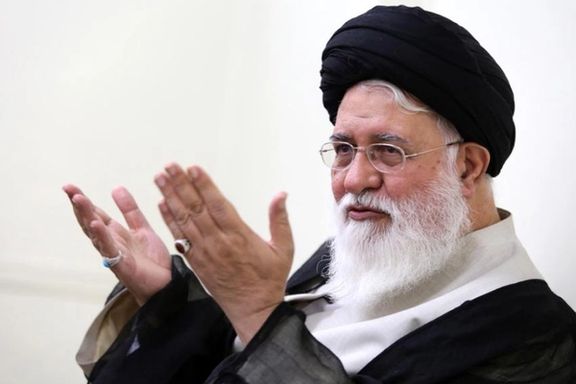
Ayatollah Ahmad Alamolhoda, a senior firebrand cleric in Iran who is President Ebrahim Raisi’s father-in-law, says Saudi Arabia is committing “genocide” against Shiites.

Ayatollah Ahmad Alamolhoda, a senior firebrand cleric in Iran who is President Ebrahim Raisi’s father-in-law, says Saudi Arabia is committing “genocide” against Shiites.
The hardliner said on Wednesday that the Saudi ruling family wants to exterminate Shiites out of the ‘land of revelation’, referring to Saudi Arabia where according to Islamic belief God's word was delivered to Prophet Muhammad, Hawzah News reported.
“Al Saud has been cooperating with the enemy in carrying out this sinister plan since the domination of Britain and the US, and has committed genocide against the Shiites”, he said
Alamolhoda maintained that beheading a 17-year-old teenager is not acceptable by any logic in the world.
Islamic republic also practices the death penalty for minors and says it is neither illegal nor against any of Iran’s international commitments.
Alamolhoda, who is Supreme Leader Ali Khamenei’s representative in Mashhad, added that Riyadh cannot be treated as a "neighbor", in a "peaceful" way.
On Sunday, Iran condemned Saudi Arabia's execution of 81 men – including 41 Shiites -- the previous day, saying, “This inhumane act was in violation of basic principles of human rights and international law, and contrary to human principles and accepted legal procedures".
Tehran also unilaterally suspended the fifth round of talks with Riyadh to mend ties that were cut in 2016 when mobs attacked its embassy in Tehran after Riyadh executed 47 dissidents including the leading Shi'ite cleric Sheikh Nimr al-Nimr.
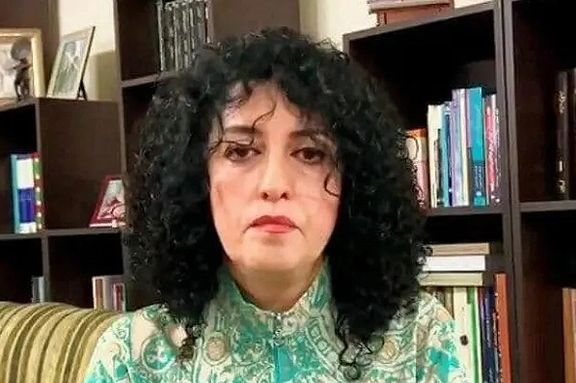
Iran's intelligence agencies prefer dissidents to leave the country when their presence is see as more detrimental than their exile, hacktivists have revealed.
A "highly confidential" letter provided to the BBC's Persian service concerning human rights defender Narges Mohammadi by the hactivist group Edalat-e Ali (Ali's Justice), if authentic, could be proof of such a policy.
In the letter which is attributed to the judicial director general of the intelligence ministry whose name has not been mentioned in the BBC report, the intelligence official suggests that Mohammadi should be allowed to leave the country as keeping her in Iran is more harmful than letting her reside abroad.
In the letter dated November 6 and addressed to Deputy Prosecutor of the Revolutionary Court of Tehran, the intelligence ministry official argues that thanks to the internet Mohammadi can have online meetings with "foreign individuals and embassies" or give interviews to Europe-based television channels. "A ban on leaving the country does not prevent her from her criminal activities."
The letter pointed out that in Iran she could anyway meet online with "foreign individuals and embassies" or give interviews to foreign television channels. The intelligence official suggested that allowing Mohammadi to leave could help highlight differences between her and other dissidents, including US-based Masih Alinejad.
Mohammadi's husband Taghi Rahmani, a pro-reform journalist, left the country for France with the couple's twin children in 2012 after serving a total of 14 years in prison himself but Mohammadi chose to stay in Iran to continue her activities as a human rights defender.
Mohammadi who has not seen her children for ten years says she would visit her husband and children in Paris if she was given a passport and permission to leave but wanted to be able to return to Iran.
Since appearing in August 2021, hackers Edalat-e Ali (Ali's Justice) have released footage from security cameras of Tehran's Evin prison and several confidential documents. Earlier this week the group provided Iran International TVwith a document showing Revolutionary Guards (IRGC) Intelligence wanted oil officials in the previous government banned from leaving Iran. The group’s name evokes the first of the twelve Shiite Imams, Ali, but may also be intended as an sarcastic reference to Supreme Leader Ali Khamenei.
Mohammadi, the vice-president of Defenders of Human Rights Center (DHRC) has been in and out of prison several times since 1998. She was released from prison in October 2020 after serving five and half years on trumped up charges.
Since her release from prison, she has been indicted in two new cases, put on trial and sentenced to prison in absentia because she refused to attend the trials – Mohammadi does not recognize the authority of the Iranian judicial system -- as a show of civil disobedience.
In an Instagram post Thursday, Mohammadi said she will not surrender to the summons to go back to prison to serve the sentences passed on her in her latest trials.
"I'm in my sixth day of disobedience toward [the order] to return to prison. Yesterday I received a letter [from judiciary authorities] to inform that the properties of the person who posted bail for me could be confiscated," she said, adding that she will continue her disobedience as long as the bail is not in danger of forfeiture.
Mohammadi won the 2022 award of the World Organisation Against Torture (OMCT) on March 12 for her documentary film White Torture which addresses the psychological damage caused by solitary confinement in a soundless, white room - a common practice in Iranian prisons.
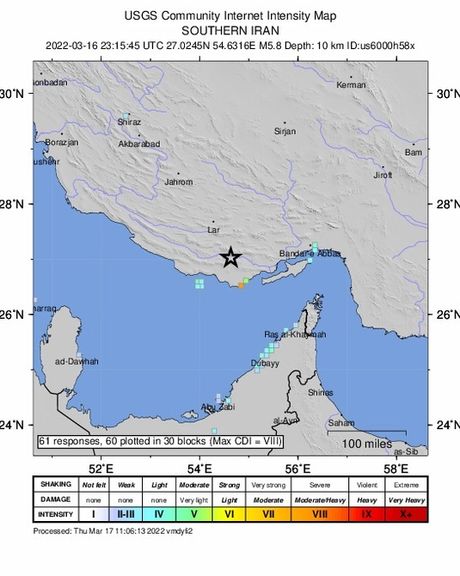
An earthquake measuring 6.0 magnitude has hit the southern Iranian province of Hormozgan and was felt in the United Arab Emirates.
According to the GFZ German Research Center for Geosciences, the quake took place early on Thursday around 2:45 a.m. local time at a depth of 10 kilometers (6.21 miles).
The United States Geological Survey (USGS) said it was a Magnitude 5.8 earthquake and its epicenter was 16 kilometers to Kookherd district and 57 kilometers to Bandar-e Lengeh harbor city.
According to locals, water, electricity and telephone line were out for a few hours in the quake-hit areas.
No casualties or significant damage have been reported so far, but Interior Minister Ahmad Vahidi said that expert teams have been dispatched to the area to assess the damage.
Twitter users in Dubai reported being woken up as their apartment buildings shook from the quake.
Iran is crisscrossed by major geological fault lines and is one of the most earthquake-prone countries in the world because it is located where the Arabian, Indian, and Eurasian tectonic plates meet.
Iran has had a terrible history of massive earthquakes in recent decades, with some killing up to tens of thousands of people and causing billions in damages, such as the magnitude 6.6 quake in Kerman province in 2003 that killed 31,000 people and flattened the ancient city of Bam.
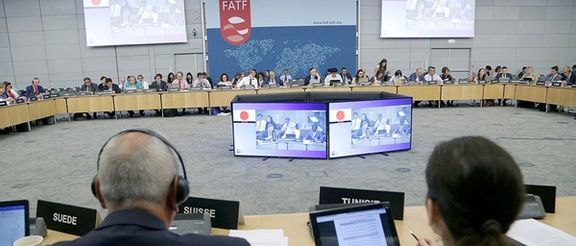
Experts say Iran's international trade will continue to suffer without accession to the money-laundering watchdog (FATF) rules, even if US sanctions are lifted.
Unlike his predecessor Hassan Rouhani, President Ebrahim Raisi and his hardliner supporters do not favor accession to the Paris-based Financial Action Task Force (FATF). Raisi in September criticized the previous administration for insisting on joining the FATF conventions and suggested that his government might prefer to focus on relations with "neighbors and friendly countries," including presumably China and Russia.
Critics of FATF have until now argued that accession would make Iran vulnerable to US sanctions and would curb its ability to support proxy forces, such as Hezbollah in Lebanon, which has also faced US sanctions.
Iran has been on the FATF blacklist, along with North Korea, since February 2020 for failing to pass legislation introducing transparency measures designed to combat money-laundering, corruption, and financing of ‘terrorism.’ FATF members – who host most of the world’s financial centers – are required to undertake enhanced diligence and countermeasures against blacklisted states.
Hardliner supporters of Supreme Leader Ali Khamenei have blocked bills approved by parliament since 2018 to be ratified by a constitutional watchdog.
Experts say with an agreement with world powers in sight to restore the 2015 nuclear deal, Joint Comprehensive Plan of Action (JCPOA), and the lifting of US sanctions, the thorny issue of accession to the FATF must be resolved urgently.
In a commentary entitled "FATF's Future After JCPOA Revival" in Tejarat (Commerce) newspaper on March 15, Mohammad Lahouti, head of Iran Export Confederation, argued that without FATF accession, other countries might hesitate to establish trade with Iran, even if US sanctions end with the signing of a nuclear deal. "The issue of FATF has to be resolved if there is a [nuclear] agreement," he wrote.
Financial and banking expert BahaoddinHashemi says even second and third-rate foreign banks will not deal with black-listed Iranian banks even if Iran improves its relations with world powers after the restoration of the JCPOA, to avoid coming under suspicion of money laundering.
"[Being on the blacklist] of the FATF is one of the most important hurdles in the way of economic relations and attracting [foreign] investment," Hashemi wrote on March 15 in Samt– a newspaper that focuses on issues related to industries, mining, and trade.
Hardliners supporting Supreme Leader Ali Khamenei and the Revolutionary Guard say Iran should “Look East” and build closer ties with China and Russia as a counterweight against the United States and conduct trade with those countries, avoiding dollar transactions as much as possible.
But failure to resolve the FATF issue would be detrimental to international economic relations even with China and Russia, experts say. FATF is a multilateral organization and whether a country trades in US dollars or not, its financial transparency rules still apply.
The FATF blacklist carries with it no formal sanctions, but financial institutions shift their resources and services away from blacklisted countries not to risk legal complications.
Former President Hassan Rouhani and his ministers often complained that hardline rivals opposed FATF accession to increase the difficulties his government faced in managing the economy. Iran would be in a better place if an agreement on the nuclear issue and accession to the FATF happened, he said last July at the general assembly of the Central Bank of Iran. Officials in the Rouhani administration and some reformists also accused hardliners of having a vested interest in practices used to circumvent sanctions.

A clear media divide has emerged in Iran over the war in Ukraine, with some hardliner media repeating Moscow’s propaganda and others trying to reflect reality.
Media affiliated with hardliner factions, including the Revolutionary Guard consistently backed the official government line in the early days of the war, saying the United States and NATO were responsibly by provoking Russia. But the government has not repeated those accusation in recent days.
Mehr news website, however, is notable in parroting pure Russian propaganda. A headline on Thursday said, “Ukrainian Forces Blew Up Mariupol Theater”.
Ukrainian officials and Western correspondents on the ground have reported that a theater in the city where hundreds were seeking refuge from Russian bombardment was targeted and although it was reported on Thursday that many survived, there is no count of how many might have died.
Russia, denying it had carried out a missile or air strike against the building, said Ukrainians blew it up to blame Moscow. Mehr carried the Russian report. The news website is run by the Islamic Propaganda Organization, a state entity financed by the presidential administration but controlled by Supreme Leader Ali Khamenei’s office.
Two news websites controlled by the Revolutionary Guard (IRGC) keep a lower profile in reporting on Ukraine.
Fars news agency had only one headline about the conflict, hidden well below other items on its website on Thursday., although it had more reporting in the early days of the invasion with an obvious pro-Russia bias. But it also tries to present Russian statements as truth, while presenting Western positions with a shroud of doubt.
The other IRGC flagship news website, Tasnim, maintains a live blog on the conflict with somewhat of a balanced reporting, although avoiding news about Russian attacks on civilians. It covers most diplomatic developments and reflects reports about support for Ukraine.
Kayhan, an ultra-conservative newspaper controlled by Khamenei’s office, strongly backed Russia's invasion of Ukraine in the early days with extensive reports and commentaries. But it has been relatively silent in the past week, perhaps sensing that Russia is stuck in an unwinnable conflict.
Tabnak website, affiliated with one of President Ebrahim Raisi’s deputies, former iRGC commander Mohsen Rezaee, has become much more balanced in its coverage in recent days.
While the hardliner media try to muddle through amid popular support for Ukraine on social media, outlets run by reform minded loyalists approach the conflict in a much more even-handed manner.
Headlines such as “Russia Bombed a Mosque – 79 Children Died” in Aftab News this week, can be observed in some newspapers and websites.
An interesting case is Fararu website, one of the relatively more independent sources given Iran's media restrictions. Fararu, publishes translations of Western press op-eds and analysis on Ukraine, as a clever way to reflect diversity of views and information.
The media divide is also visible on attitudes toward Russia as they relate to Iran and its nuclear negotiations with the West.
After Russia demanded exemption from Ukraine sanctions in its relations with Iran, media with a reformist tilt called Moscow an “obstructionist” who has taken Iran’s nuclear talks with the West hostage. Hardliner media stayed away from criticizing Russia, reflecting government statements seen by many as supportive of Moscow.
Whether the centers of power in the Islamic Republic tolerate the anti-Russian tone of some newspapers and websites, or simply are too busy these days amid nuclear talks and launching ballistic missiles at Iraq, is hard to say.
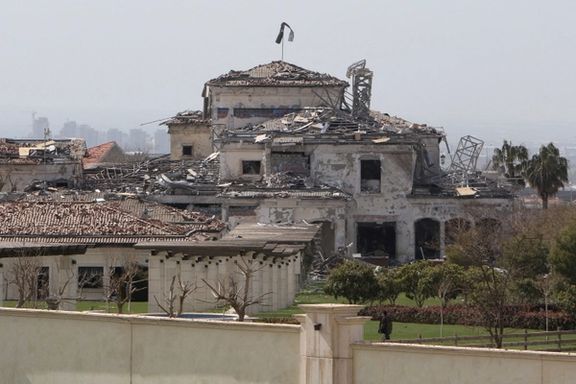
The United States’ mission to the United Nations has urged a Security Council session over Iran’s ballistic missile attack at Iraq’s Erbil.
In a tweet on Wednesday, the US mission called for a UN Security Council discussion “to condemn Iran’s missile attack on the Kurdistan Region of Iraq”.
Describing it as “reckless and unprovoked”, the mission said, “the attack struck a civilian residence in Erbil and was an outrageous violation of Iraq’s sovereignty and territorial integrity”.
“Security Council members should condemn this attack, hold Iran accountable, and support Iraq’s democracy and sovereignty”, it added.
Iran's Revolutionary Guards (IRGC) took responsibility for targeting the capital of Iraq's autonomous Kurdistan with over a dozen ballistic missiles allegedly to destroy an Israeli intelligence base, while reports say the Biden Administration is considering removing IRGC from its foreign terrorist blacklist.
Sunday’s missiles fell close to a United States consulate building, damaging a villa that Iran claimed was used by Israelis.
Earlier on Monday, the Supreme Judicial Council of the Iraqi Kurdistan Region called on Baghdad to refer the case of Iran's attack to the UN Security Council, saying the government must take all necessary measures against the violation of Iraq’s sovereignty.
The council also urged the Iraqi parliament and international institutions to take "decisive and serious" action to stop Iran's strikes.
The Iranian parliament has issued a statement praising the Revolutionary Guard for its attack.